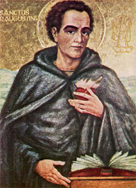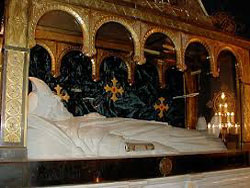Cellitinnen Augustinian Sisters
Augustine of Hippo



St. Augustine of Hippo
Aurelius Augustinus Hipponensis (13 November 354 – 28 August 430), also known as Saint Augustine or Saint Austin, was an early Christian theologian and philosopher whose writings influenced the development of Western Christianity and Western philosophy. He was the bishop of Hippo Regius (modern-day Annaba, Algeria), located in Numidia (Roman province of Africa). He is viewed as one of the most important Church Fathers in the Western Christianity for his writings in the Patristic Era. Among his most important works are City of God and Confessions.
According to his contemporary, Jerome, Augustine "established anew the ancient Faith”. In his early years, he was heavily influenced by Manichaeism and afterward by the Neo-Platonism of Plotinus. After his baptism and conversion to Christianity in 387, Augustine developed his own approach to philosophy and theology, accommodating a variety of methods and perspectives. Believing that the grace of Christ was indispensable to human freedom, he helped formulate the doctrine of original sin and made seminal contributions to the development of just war theory.
When the Western Roman Empire began to disintegrate, Augustine developed the concept of the Catholic Church as a spiritual City of God, distinct from the material Earthly City. His thoughts profoundly influenced the medieval worldview. The segment of the Church that adhered to the concept of the Trinity as defined by the Council of Nicaea and the Council of Constantinople closely identified with Augustine's City of God.
In the Catholic Church and the Anglican Communion, he is a saint, a pre-eminent Doctor of the Church, and the patron of the Augustinians. His memorial is celebrated on 28 August, the day of his death. Many Protestants, especially Calvinists, consider him to be one of the theological fathers of the Protestant Reformation due to his teachings on salvation and divine grace.
Childhood and education
Augustine was born in 354 in the municipium of Thagaste (now Souk Ahras, Algeria) in Roman Africa. His mother, Monica, was a devout Christian; his father Patricius was a Pagan who converted to Christianity on his deathbed. Scholars believe that Augustine's ancestors included Berbers, Latins, and Phoenicians. He considered himself to be Punic, and as "an African, writing of Africa, or at any rate, with that flat nose you see in Africans". Augustine's family name, Aurelius, suggests that his father's ancestors were freedmen of the gens Aurelia given full Roman citizenship by the Edict of Caracalla in 212. Augustine's family had been Roman, from a legal standpoint, for at least a century when he was born. Augustine's first language is likely to have been Latin. At the age of 11, he was sent to school at Madaurus (now M'Daourouch), a small Numidian city about 19 miles south of Thagaste. There he became familiar with Latin literature, as well as pagan beliefs and practices. His first insight into the nature of sin occurred when he and a number of friends stole fruit they did not want from a neighborhood garden.
At the age of 17, through the generosity of his fellow citizen Romanianus, Augustine went to Carthage to continue his education in rhetoric. It was while he was a student in Carthage that he read Cicero's dialogue Hortensius (now lost), which he described as leaving a lasting impression and sparking his interest in philosophy. Although raised as a Christian, Augustine left the church to follow the Manichaean religion, much to his mother's despair. As a youth Augustine lived a hedonistic lifestyle. It was during this period that he uttered his famous prayer, "Grant me chastity and continence, but not yet."
At about the age of 19, Augustine began an affair with a young woman in Carthage. Though his mother wanted him to marry a person of his class, the woman remained his love for over thirteen years and gave birth to his son Adeodatus who was viewed as extremely intelligent by his contemporaries. In 385, Augustine ended his relationship with his lover in order to prepare himself to marry an heiress.
He was from the beginning a brilliant student, with an eager intellectual curiosity, but he never mastered Greek—he tells us that his first Greek teacher was a brutal man who constantly beat his students, and Augustine rebelled and refused to study. By the time he realized that he needed to know Greek, it was too late; and although he acquired a smattering of the language, he was never eloquent with it. However, his mastery of Latin was another matter. He became an expert both in the eloquent use of the language and in the use of clever arguments to make his points.
Teaching Rhetoric
Augustine taught grammar at Thagaste during 373 and 374. The following year he moved to Carthage to conduct a school of rhetoric and would remain there for the next nine years. Manichaean friends introduced him to the prefect of the City of Rome, Symmachus, who had been asked by the imperial court at Milan to provide a rhetoric professor. Augustine won the job and headed north to take his position in late 384. Thirty years old, he had won the most visible academic position in the Latin world at a time when such posts gave ready access to political careers.
While still at Carthage a disappointing meeting with the Manichaean Bishop, Faustus of Mileve, a key exponent of Manichaean theology, started Augustine's skepticism of Manichaeanism. In Rome, he reportedly turned away from Manichaeanism, embracing the scepticism of the New Academy movement. Because of his education, Augustine had great rhetorical prowess and was very knowledgeable of the philosophies behind many faiths. At Milan, his mother's religiosity, Augustine's own studies in Neoplatonism, and his friend Simplicianus all urged him towards Christianity. Initially Augustine was not strongly influenced by Christianity and its ideologies, but after coming in contact with St. Ambrose of Milan, Augustine reevaluated himself and was forever changed.
Like Augustine, Ambrose was a master of rhetoric, but older and more experienced. Saint Augustine of Hippo was very much influenced by Ambrose of Milan, even more than by his own mother and others he admired. Augustine arrived in Milan and was immediately taken under the wing by St Ambrose. Within St. Augustine’s work, Confessions, Augustine states, “That man of God received me as a father would, and welcomed my coming as a good bishop should.” Soon, their relationship grew, as Augustine wrote, "And I began to love him, of course, not at the first as a teacher of the truth, for I had entirely despaired of finding that in thy Church—but as a friendly man”. Augustine visited Ambrose in order to see if Ambrose was one of the greatest speakers and rhetoricians in the world. More interested in his speaking skills than the topic of speech, Augustine quickly discovered that Ambrose was a spectacular orator. Eventually, Augustine says that through the unconscious, he was led into the faith of Christianity.
Augustine's mother had followed him to Milan and arranged a marriage for which he abandoned his concubine. Although Augustine accepted this marriage, Augustine was deeply hurt by the loss of his lover. There is evidence that Augustine may have considered this former relationship to be equivalent to marriage
Alypius of Thagaste steered Augustine away from marriage, saying that they could not live a life together in the love of wisdom if he married. Augustine looked back years later on the life at Cassiciacum, a villa outside of Milan where he gathered with his followers, and described it as Christianae vitae otium – the Christian life of leisure.
Christian conversion and priesthood
In the summer of 386, at the age of 31, after having heard and been inspired and moved by the story of Placianus's and his friends' first reading of the life of Saint Anthony of the Desert, Augustine converted to Christianity. As Augustine later told it, his conversion was prompted by a childlike voice he heard telling him to "take up and read" (Latin: tolle, lege), which he took as a divine command to open the Bible and read the first thing he saw. Augustine read from Paul's Epistle to the Romans – the so-called "Transformation of Believers" section, consisting of chapters 12 through 15 – wherein Paul outlines how the Gospel transforms believers, and the believers' resulting behaviour. The specific part to which Augustine opened his Bible was Romans chapter 13, verses 13 and 14, “Not in rioting and drunkenness, not in chambering and wantonness, not in strife and envying, but put on the Lord Jesus Christ, and make no provision for the flesh to fulfill the lusts thereof”.
He later wrote an account of his conversion – his very transformation, as Paul described – in his Confessions, which has since become a classic of Christian theology and a key text in the history of autobiography. This work is an outpouring of thanksgiving and penitence. Although it is written as an account of his life, the Confessions often speculates about the nature of time, causality, free will, and other important philosophical topics. The following is taken from that work:
Late have I loved Thee, O Lord; and behold,
Thou wast within and I without, and there I sought Thee.
Thou was with me when I was not with Thee.
Thou didst call, and cry, and burst my deafness.
Thou didst gleam, and glow, and dispell my blindness.
Thou didst touch me, and I burned for Thy peace.
For Thyself Thou hast made us,
And restless our hearts until in Thee they find their ease.
Late have I loved Thee, Thou Beauty ever old and ever new.
Thou hast burst my bonds asunder;
Unto Thee will I offer up an offering of praise.
Ambrose baptized Augustine, along with his son Adeodatus, on Easter Vigil in 387 in Milan. A year later, in 388, Augustine completed his apology On the Holiness of the Catholic Church. That year, also, Adeodatus and Augustine returned to Africa, Augustine's home continent. Augustine's mother Monica died at Ostia, Italy, as they prepared to embark for Africa. Upon their arrival, they began a life of aristocratic leisure at Augustine's family's property. Soon after, Adeodatus, too, passed away. Augustine then sold his patrimony and gave the money to the poor. The only thing he kept was the family house, which he converted into a monastic foundation for himself and a group of friends.
In 391 Augustine was ordained a priest in Hippo Regius (now Annaba), in Algeria. He became a famous preacher, and was noted for combating the Manichaean religion, to which he had formerly adhered.
In 395 he was made coadjutor Bishop of Hippo, and became full Bishop shortly thereafter, hence the name "Augustine of Hippo"; and he gave his property to the church of Thagaste. He remained in that position until his death in 430. He wrote his autobiographical Confessions in 397-398. His work The City of God was written to console his fellow Christians shortly after the Visigoths had sacked Rome in 410.
Augustine worked tirelessly in trying to convince the people of Hippo to convert to Christianity. Though he had left his monastery, he continued to lead a monastic life in the Episcopal residence. He left a regula for his monastery that led to his designation as the "patron saint of regular clergy."
Much of Augustine's later life was recorded by his friend Possidius, bishop of Calama (present-day Guelma, Algeria), in his Sancti Augustini Vita. Possidius admired Augustine as a man of powerful intellect and a stirring orator who took every opportunity to defend Christianity against its detractors. Possidius also described Augustine's personal traits in detail, drawing a portrait of a man who ate sparingly, worked tirelessly, despised gossip, shunned the temptations of the flesh, and exercised prudence in the financial stewardship of his see.
Death and veneration
Shortly before Augustine's death the Vandals, a Germanic tribe that had converted to Arianism, invaded Roman Africa. The Vandals besieged Hippo in the spring of 430, when Augustine entered his final illness. According to Possidius, one of the few miracles attributed to Augustine, the healing of an ill man, took place during the siege. According to Possidius, Augustine spent his final days in prayer and repentance, requesting that the penitential Psalms of David be hung on his walls so that he could read them. He directed that the library of the church in Hippo and all the books therein should be carefully preserved. He died on 28 August 430. Shortly after his death, the Vandals lifted the siege of Hippo, but they returned not long thereafter and burned the city. They destroyed all of it but Augustine's cathedral and library, which they left untouched.
Augustine was canonized by popular acclaim, and later recognized as a Doctor of the Church in 1298 by Pope Boniface VIII. His feast day is 28 August, the day on which he died.

